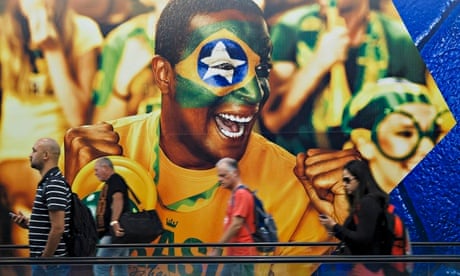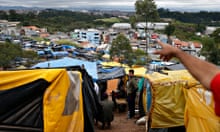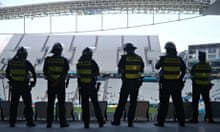The countdown clocks have clicked down towards zero. The air force is on alert. Navy frigates patrol the coastline and an army of 147,000 police and soldiers has been mobilised. Roads usually choked with traffic are emptying of cars. Schools have been closed. Offices are finishing early. Hundreds of millions of TV sets are being tuned in to the same event.
By 5pm on Thursday, Brazil should finally be ready for the moment this football-obsessed nation has been dreaming of – and dreading – for the past seven years: the kickoff of the World Cup finals.
The biggest, costliest and arguably most controversial tournament in the sport's history will get under way at the Itaquerão stadium with a star-studded ceremony and a match between the host nation and Croatia.
But all is not well in the global football family. Parting with protocol, the host president, Dilma Rousseff, and Fifa head, Sepp Blatter, will not give a speech because they fear a repeat of last year's Confederations Cup opening when their words were drowned out by jeers and whistles.
While Pitbull, Claudia Leitte and Jennifer Lopez perform the official song, We are One, demonstrators on the streets are planning to chant a discordant message about inequality, forced evictions and overspending on the $11.5bn event.
And as Neymar, Paulinho, Hulk, Fred and their compatriots file through the stadium tunnel in São Paulo, workers in other host cities are still wrestling with the final touches on construction projects that are chronically late, over budget and fatally ill managed. Fifa, though, has declared all 12 venues ready and once the football starts, it will hope that attention shifts to the pitch rather than the streets.
This tournament has the potential to be both the greatest and the worst in the history of the sport. Brazil is arguably the most football-obsessed nation on Earth, with the most successful record in World Cup history and a reputation as a party capital. But this tournament is more than usually heavy with political significance, coming as it does in the midst of a crisis of confidence in the way that both Brazil and global football are run.
Earlier this week, Blatter came under attack at the Fifa congress for presiding over an organisation mired in corruption scandals, deeply unpopular with the global public and struggling to explain how Qatar was awarded the 2022 tournament – a decision that the president now acknowledges was a "mistake". The host nation too is deep in a funk that shows no sign of abating, even as Rousseff prepares for a re-election bid in October. The economy is in the doldrums, opinion polls suggest 72% of the electorate is dissatisfied with the government, and the authorities have failed to mollify a protest movement that brought more than a million people on to the streets during the Confederations Cup.
"There has never been a World Cup so important in Brazil's history," said Euclides de Freitas Couto, professor of social sciences at the Federal University of São João del-Rei-Brasil. "The extensive politicisation of the tournament has triggered a popular backlash against the football team. This is unheard of."
Recent protests have been far smaller than the million-plus crowds that marched in 50 cities last year, but some have been violent and disruptive. Earlier this week, São Paulo was the scene of teargas volleys, street fires and dire traffic congestion during a subway workers' strike that was timed to embarrass the authorities into concessions before the World Cup.
Graffiti in many cities asks "Copa pra quem?" ("Who is this cup for?") and several giant murals have appeared in recent weeks depicting the suffering caused by the tournament. At least three groups of protesters are calling for a new round of anti-World Cup demonstrations on Thursday. One planned for Copacabana beach is publicised by the image of black-masked protesters holding a banner reading "Fifa Killers Fuck Off. Long Live Favela Riots".
Rousseff has hinted darkly at a pre-election conspiracy against her. To ensure minimal disruption, the authorities will mount an $850m operation to guard the perimeters of the stadiums and ensure the safety of the teams. The World Cup is now considered so perilous and important that the air force will send 24 Super Tucano counter-insurgency planes, three radar aircraft and 11 helicopters to ward off any threat from the skies. Navy vessels are patrolling the coast – part of a deployment of four frigates, one corvette, 21 launches and 13,000 personnel mobilised to defend the tournament. Wars have been fought with smaller displays of force.
But this is only a fraction of the outlay on this World Cup. Spending so far is estimated at $11.5bn – a sum bigger than the GDP of a quarter of the world's countries. Most of that money has been poured into concrete and steel – new and upgraded stadiums and transport infrastructure. The government promised no public money would be used to build arenas, but close to $3bn ended up coming from the taxpayer's purse after delays and overspending prompted government intervention.
Odebrecht – the biggest construction firm in Brazil and a major contributor to Rousseff's Workers party – looks to be among the major financial beneficiaries of the tournament. Fifa is also expecting a boost, with $4bn income from ticket sales, sponsorship and broadcasting rights. At Fifa's insistence, this will be tax exempt. Brazil's inland revenue estimates the loss to government coffers at about $242million, even as host cities fall deeper into debt to pay for stadiums and infrastructure.
Anti-poverty activists are now campaigning to ensure that this is the last World Cup where Fifa can shift so much of the burden on to the host nation.
"This is a clear example of how the eradication of poverty and inequality is a political decision. The World Cup tax exemptions hinder the achievement of a successful future for Latin America and the Caribbean," said Christian Aid.
Even now, builders are labouring to finish the external areas at several sites and the Itaquerão stadium was so late that it has yet to stage a full-scale test event. The opening match will be the first time the venue will be used to its full 61,606 capacity. At the Arena Amazonia, where England will play their opening game against Italy on Saturday, workers are still asphalting the ground outside the stadium, fitting doors and fixing power cables in the changing room. The newly laid pitch is already showing signs of degradation.
But despite these concerns, excitement is building. An influx of visiting fans and players has injected a much needed buzz to the host nation. Foreign languages are increasingly heard in the bars of Rio, pasty skin is more evident on the beach, and a cosmopolitan festival vibe is descending on the streets. More Brazilian flags are appearing in windows and on cars, though not nearly as many as during previous World Cups.
First-timers at the tournament are impressed. "It's just starting to hit home this week. Come to the country and you start to feel the buzz. It's increasing each day," said the England midfielder Adam Lallana on a visit to the Rocinha favela.
Brazil's mood-making football columnist Juca Kfouri entered into the spirit with a piece headed Butterflies in my stomach. "As the games approach, on the eve of each of them, we're overtaken by qualms, the exaggerated respect, the risk of embarrassment, the fear of pain, of humiliation. That is inevitable," he writes.
Much will now depend on the home team's performance. A victory in the opening match could further lift spirits. If – one month and 64 games from now – Brazil can emerge as victors, this tournament may yet be seen as a success. But the alternative could lead to more than just disappointment, according to Marcos Guterman, author of Football Explains Brazil.
"If Brazil gets eliminated from the tournament before the final, I predict big problems," he says. "The World Cup is a measurement of our capacity, on and off the field. For years everyone's been saying, 'We're going to give the cup of cups and that this will show we're capable,' but now that the cup is actually happening, there have been so many problems in the planning – so many delays, promised projects not happening, public transportation works that haven't even started, incomplete stadiums – if Brazil does not make is to the final I have no doubt that all these problems will be exacerbated. They will seem much worse."
Diogo Barbosa, a fan in Rio, said: "I will watch the games and I will support my team, but there are more important things to watch – like the course the protests will take, the image Brazil will leave, and whether the effect of hosting will be positive for Brazil … If you mix up everything that's happened, it's likely that Brazil will grow from this situation, if not in money, [then] in spirit."
Another fan, Michel Silva, said: "I'm not so excited, not like I was for the cup in 2002. I hope the team does well, but I don't agree with the high investments that the federal government made in the stadiums. Brazil has a huge deficit in the areas of healthcare, education and urban transport." But there is excitement too: "We've got a well-oiled team, the stadiums are ready and urban transport is good. It's just joyous," said a fan, Silas Lima.
Joyce Rocha, a football player, said: "People are less excited this year because of what's happening in the country, but Brazil has always been like this. With or without the Cup, education and health care has always been terrible because the politicians put all the money in their own pockets. But I'm going to support our team with the same force as always. What else can we do but cheer?" Geography teacher Wesley Lima Rios said and his seven-months pregnant wife will drive three hours to see a match. "It's a once-in-a-lifetime opportunity," he said. "People were a bit wary due to the negative campaign that has been done against the Cup, mainly in the mainstream media … But the perception is starting to change on the eve of the Cup. Now it is getting going."
Veteran fans acknowledge how fickle support has been in the past. Thiago Santos, 77, remembers the misery of Brazil's defeat in the 1950 final at the Maracanã and the unease that many felt about supporting the 1970 team during the dictatorship. But he said moods change along with results. "We always live in a crisis, but the football comes along and we forget everything."
Additional reporting by Anna Kaiser





Comments (…)
Sign in or create your Guardian account to join the discussion